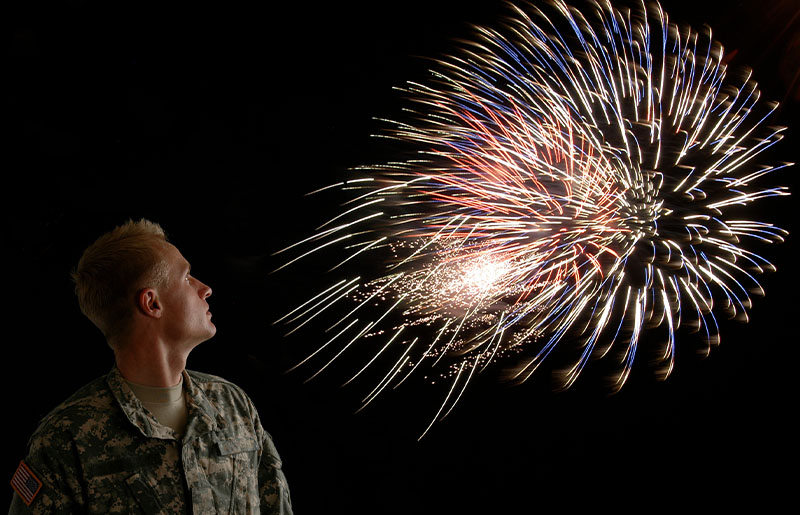
Balancing Celebration and Sensitivity: Fireworks and Their Impact on Veterans with PTSD
As the bright hues burst across the night sky, the smell of smoke wafts through the air, and the booming sound reverberates off buildings, many Americans revel in the joy and excitement of fireworks. However, for some, these sensory experiences can trigger past traumas, particularly among veterans who have served in combat situations.
According to the U.S. Department of Veterans Affairs, fireworks can act as trauma reminders, or "triggers," to those who have undergone traumatic events such as fires, explosions, gunfire, or any violent incidents where loud noises and bright flashes were involved. These events may have occurred during military service or in civilian life, causing those affected to potentially relive their experiences during firework displays.
Fireworks are a common feature in many celebrations, from national holidays to sports events, concerts, and various festive occasions. While they fill most people with awe and joy, for some veterans, the loud explosions and intense lights can trigger distressing memories of combat situations and explosions. Similarly, certain military-related celebrations may spur a heightened emotional response.
The impact of these trauma reminders can vary. Some common reactions to the sound or sight of fireworks include flashbacks, emotional detachment, feelings of lack of control over the situation, and in some severe cases, turning to alcohol or drugs to suppress unwanted thoughts.
Despite the potential for distress, there are ways to manage these triggers and mitigate their impact, particularly for veterans. The Veterans Affairs website offers advice and coping strategies such as reminding oneself of the present, focusing on the meaning of military-related holidays that foster self-care, and learning about any firework displays in advance to prepare emotionally.
Veterans are also advised to invite trusted confidants to join them, practice self-care techniques like good sleep, breathing exercises, journaling, and mindfulness, and choose activities that help them feel safe and healthy. In the moment, techniques such as box breathing and mindfulness can help ground veterans in the present, reminding them of their safety.
Those who care about veterans dealing with trauma reminders can provide support by offering words of reassurance, practicing mindfulness activities together, or working with them to identify and manage trauma cues.
Event organizers can be considerate of those affected by fireworks by considering the use of alternatives to loud fireworks, informing guests of any planned fireworks ahead of time, and ensuring the availability of quiet spaces for guests who might need them.
Remember, for many veterans with PTSD, fireworks might not be cause for celebration but a reminder of troubling pasts. It's important to show compassion, practice understanding, and provide support. With planning, practice, and professional support, they too can partake in, and enjoy, celebrations that include fireworks.
For more advice and support, the U.S. Department of Veterans Affairs provides a wealth of information and resources for veterans dealing with trauma reminders from fireworks and similar cues. Learn more at ptsd.va.gov/index.asp.
 Tiffany Krenek has been on the My Neighborhood News team since August 2021. She is passionate about curating and sharing content that enriches the lives of our readers in a personal, meaningful way. A loving mother and wife, Tiffany and her family live in the West Houston/Cypress region.
Tiffany Krenek has been on the My Neighborhood News team since August 2021. She is passionate about curating and sharing content that enriches the lives of our readers in a personal, meaningful way. A loving mother and wife, Tiffany and her family live in the West Houston/Cypress region.

